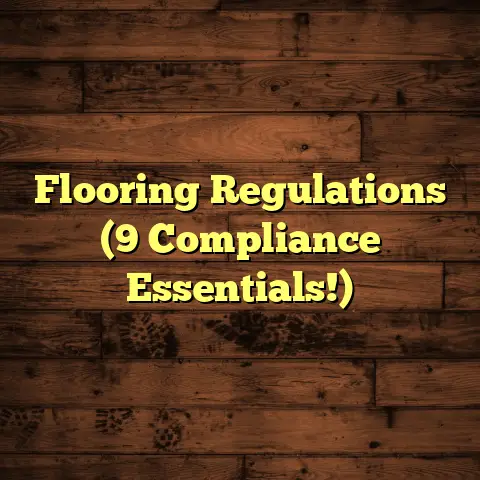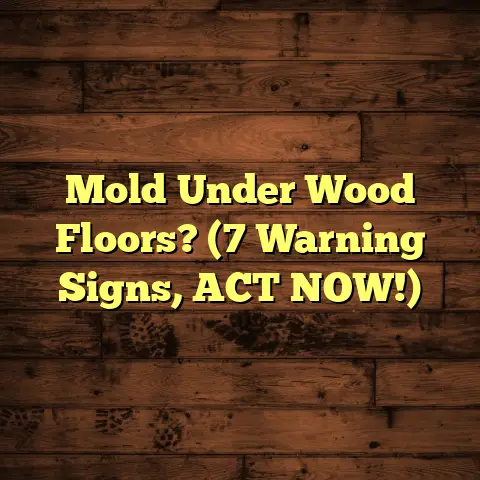Murphy Oil Soap on Laminate? (Don’t Do This!)
Today, we’re tackling a topic that can save you a lot of heartache (and money!): Murphy Oil Soap on laminate flooring.
Expert Tip: Listen up!
While laminate is super easy to care for, using the wrong cleaner can cause irreversible damage.
Steer clear of Murphy Oil Soap on your laminate.
Its oil-based formula leaves a residue that dulls the finish and attracts dirt like crazy.
“Using the right cleaning products is just as important as choosing the right flooring in the first place.
With laminate, less is often more!” – Bob Vila, Home Improvement Expert
Section 1: Understanding Laminate Flooring
So, what is laminate flooring anyway?
Laminate is a multi-layer synthetic flooring product fused together through a lamination process.
Typically, it consists of:
- A wear layer: A transparent, protective top coat.
- A decorative layer: A high-resolution image of wood, stone, or tile.
- A core board: Usually made of high-density fiberboard (HDF) or medium-density fiberboard (MDF).
- A backing layer: Provides stability and moisture resistance.
Laminate’s Popularity
Why do so many people choose laminate?
It’s a real winner in homes and businesses for a few key reasons:
- Cost-Effective: Laminate gives you the look of hardwood or tile without the hefty price tag.
- Durable: It’s scratch-resistant, stain-resistant, and can handle a lot of foot traffic.
- Easy Installation: Many laminate floors are designed with a click-lock system, making DIY installation a breeze.
According to a recent report by Statista, the global laminate flooring market is projected to reach \$44.7 billion by 2027.
That’s a lot of laminate!
Section 2: The Composition of Murphy Oil Soap
Okay, let’s talk about Murphy Oil Soap. What’s in it?
This classic cleaner typically contains:
- Water: The main solvent.
- Soap: Made from vegetable oil.
- Fragrance: For that signature “clean” smell.
- Other additives: To enhance cleaning power and stability.
Intended Use
Murphy Oil Soap is designed primarily for wood surfaces.
The oil is meant to nourish and protect wood, giving it a rich sheen.
Potential Risks
Here’s the catch: Laminate isn’t real wood.
It doesn’t need to be “nourished” with oil.
Using Murphy Oil Soap on laminate can lead to:
- Residue Buildup: The oil creates a sticky layer that attracts dirt.
- Dulling: The finish loses its luster.
- Damage: Over time, the residue can even damage the laminate’s surface.
Section 3: How Murphy Oil Soap Affects Laminate Floors
What actually happens when you put Murphy Oil Soap on laminate?
The oil in the soap doesn’t absorb into the laminate like it would into real wood.
Instead, it sits on the surface, creating a film.
Residue Buildup
This oily residue attracts dust, dirt, and grime like a magnet.
You’ll notice your floors getting dirty faster, and they’ll be harder to clean.
Long-Term Effects
Over time, the residue can cause:
- Dullness: The laminate loses its shine and looks lifeless.
- Discoloration: The oil can trap dirt, leading to a dingy appearance.
- Peeling: In severe cases, the residue can weaken the adhesive holding the laminate layers together, leading to peeling.
I’ve personally seen floors where the residue was so thick, you could actually scrape it off with your fingernail.
Trust me, you don’t want that!
Section 4: Common Misconceptions
Why do some people think oil-based products are okay for laminate?
There are a few common misconceptions out there:
- “It makes wood floors shine, so it must be good for laminate too.” False!
Laminate doesn’t benefit from oil like real wood does. - “A little bit won’t hurt.” Even a small amount of oil can build up over time.
- “It’s a natural product, so it’s safe.” Natural doesn’t always mean appropriate.
Debunking the Myths
Let’s set the record straight:
- Laminate doesn’t need oil. It’s designed to be cleaned with gentle, water-based solutions.
- Oil-based products can damage laminate. They leave a residue that dulls the finish and attracts dirt.
- There are better alternatives. We’ll get to those in the next section!
Section 5: Alternative Cleaning Solutions for Laminate Flooring
So, what should you use to clean your laminate floors?
Here are some safe and effective options:
- pH-Balanced Cleaners: These are specifically designed for laminate and won’t leave a residue.
Look for cleaners labeled “for laminate floors.” - DIY Cleaning Solution: Mix 1/4 cup of white vinegar with 1 gallon of warm water.
This is a gentle and effective cleaner. - Commercial Laminate Floor Cleaners: Many brands offer excellent cleaning products for laminate floors.
Benefits of pH-Balanced Cleaners
Why are pH-balanced cleaners the best choice?
- They won’t damage the finish.
- They won’t leave a residue.
- They’re safe for your family and pets.
Section 6: Additional Tips for Maintaining Laminate Flooring
Beyond choosing the right cleaner, here are some other tips to keep your laminate floors looking their best:
- Sweep or vacuum regularly: This removes dirt and debris that can scratch the surface.
- Use a microfiber mop: Microfiber is gentle and effective at picking up dirt.
- Clean up spills immediately: Don’t let liquids sit on the floor for too long.
- Use furniture pads: Protect your floors from scratches caused by furniture.
- Avoid abrasive cleaners: These can damage the finish.
- Don’t use steam mops: The excessive moisture can seep into the seams and damage the core board.
I always tell my clients, “Prevention is key!” Taking these simple steps can save you a lot of time and money in the long run.
Section 7: Real-Life Experiences and Case Studies
I’ve seen firsthand the damage that Murphy Oil Soap can do to laminate floors.
Anecdote 1: The Dull Dining Room
A client of mine used Murphy Oil Soap on her laminate dining room floor for years.
She thought it was making the floor shine, but over time, it became dull and lifeless.
When I inspected it, I could see a thick, greasy residue on the surface.
We had to strip the floor and apply a new finish to restore its luster.
Anecdote 2: The Peeling Problem
Another client had a similar issue, but worse.
The Murphy Oil Soap had weakened the adhesive holding the laminate layers together, causing the floor to peel in several areas.
The only solution was to replace the entire floor.
These experiences highlight the importance of using the right cleaning products.
Don’t make the same mistake!
Conclusion
So, let’s recap: Don’t use Murphy Oil Soap on your laminate floors!
It leaves a residue that dulls the finish, attracts dirt, and can even damage the floor over time.
Instead, use a pH-balanced cleaner specifically designed for laminate, or a simple solution of vinegar and water.
Remember the expert tip I shared at the beginning?
Using the right cleaning products is crucial for maintaining the longevity and beauty of your laminate floors.
By following these tips, you can keep your floors looking their best for years to come.
Happy cleaning!





